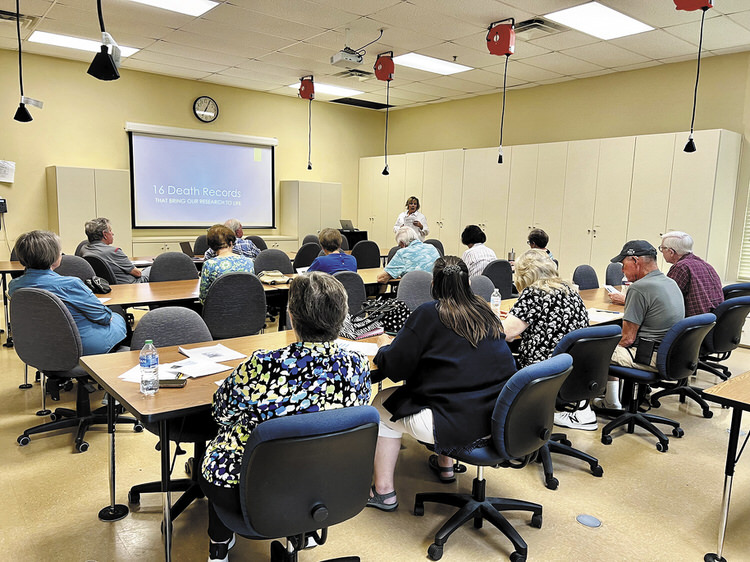
Robson Ranch Genealogy Club members listen to Patti Gillespie’s talk on death records.
As the Robson Ranch Genealogy Club continues its study and research of our military ancestors, we enjoyed several informative programs last month. On April 16 genealogist Patti Gillespie presented a program on “Sixteen Death Records That Will Bring Your Research to Life.” She explained the importance of beginning our research at the end of an ancestor’s life—with their death record. We learned that a death record could contain much-needed information, such as the ancestor’s full name, other family members, his age, parents’ names, marital status, and occupation, as well as information on his death and burial. We were also shown how to gain information through funeral records, the U.S. Census, Social Security applications, wills and probate, and newspaper searches. Patti then explained about mug books, the county history of generations. Many of us had never heard of mug books but are excited to start looking for them. She ended her discussion by telling us to Google our ancestors’ names and even do a search on Amazon. We might even find a book dealing with our family history.
On May 7 genealogist Bernard Meisner returned to enlighten us on “The History and Research of Civil War Pensions.” After the Civil War, one-third of the elderly population applied for a pension. Most Union Army soldiers, their widows, or their children were a part of the pension process. Confederate veterans had to apply through the state where they resided. Bernard explained that most Civil War pensions are housed at the National Archives in Washington, D.C., but some are available at the National Archives at St. Louis. During his presentation, we were shown the gems he found while researching the pensions of several of his Civil War ancestors. Since the applicant had to prove why he deserved a pension, these documents often include birth information, marriage certificates, and military service records.
Come discover your family heritage and ancestry with us. We meet on the first and third Tuesday at 7 p.m. in the CATC, Room 104. Our upcoming program on May 21 will be “The Importance of Collateral Research and DNA.” One of our resident genealogists, Emily Richardson, will explain how important it is to expand our research to the families of our ancestors. Collateral research can offer insight into migration patterns, marriages, cemeteries, and naming patterns that expand across generations. Help Sessions are held monthly at 2 p.m. in the CATC, Room 104. Experienced genealogists will be available to answer questions and help members with their research.
If you have any questions or would like more information about the Robson Ranch Genealogy Club, please contact us at robsongenealogyclub@gmail.com.
